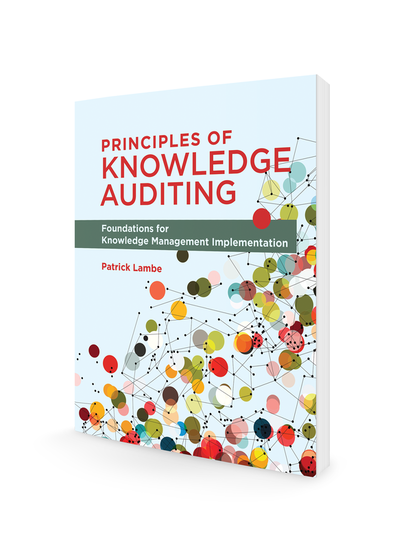Principles of Knowledge
Foundations for Knowledge Management Implementation
By Patrick LambeA comprehensive theoretical and practical guide to the operating principles of knowledge auditing.
This book aims to help knowledge managers bring consistency and rigour to the way they identify and evaluate knowledge management needs. Patrick Lambe brings theory and practice together in a lucid and engaging way, and with numerous illustrative case studies. 424 pp., 7 x 9 in, 18 b&w illus. Published by the MIT Press
Available worldwide: you can also order from your favorite bookstore!
|
About the Book
|
A knowledge audit provides an “at a glance” view of an organization’s needs and opportunities. Its purpose is to improve an organisation’s effectiveness through a better understanding of the dynamics and levers of knowledge production, access, and use.
However, this developing field is hampered by the lack of a common language about the origins and nature of knowledge auditing. In Principles of Knowledge Auditing, Patrick Lambe integrates the theory and practices of the field, laying out principles and guidelines for a clearer and more pragmatic approach to knowledge auditing that makes it more accessible to practitioners and researchers. |
Patrick examines knowledge auditing in the context of the development of communications, information, and knowledge management in the twentieth century. He critiques and clarifies ambiguities in how knowledge audits are approached and described, as well as how the results are conveyed within organizations.
Patrick also discusses the benefits and risks of knowledge management standards. Knowledge auditors, he says, need a common frame of reference more than they need standards. Standards have their uses, but they provide only markers and sign posts and are poor representations of the richness of the landscape. He concludes with a set of guiding principles for practitioners. |
Praise for the Book
|
“This book provides a comprehensive and critical review of mainstream knowledge management from its inception to the current day. It also covers the role and nature of knowledge audits, but it is much more than that. Lambe writes in an engaging and rigorous style, and this book represents a major contribution to the field with clear lessons for future development.”
Dave Snowden, Director and Founder, The Cynefin Company “Knowledge auditing is a key element in the study of organizational knowledge and no one I know knows more about this than Patrick Lambe. He has the distinct advantage of being both a practitioner and a theorist, which gives him a very practical perspective on a subject that can be too abstract and elusive to the user.”
Laurence Prusak, Principal of the Smart Mission Group; co-author of Working Knowledge “Knowledge management has struggled to become a mainstream management practice for many organizations. How can that be? We are in the middle of a knowledge-driven economic era, where identifying and managing knowledge effectively and systematically should be one of the core activities for all organizations. This book is a great addition to the core knowledge management references, and it will benefit both practitioners and academics.”
Vincent Ribiere, Managing Director of the Institute for Knowledge and Innovation Southeast Asia (IKI-SEA), Bangkok University “The book is excellent. It is comprehensive, deep, reflective, lucid, entertaining. I learned a lot. It does sit between theory and practice but that aligns it with its "middle out" message. Reflective KM practitioners should relish it.”
Matt Moore, Practitioner in Knowledge Management, Project and Program Management, Sydney, Australia “This is the most thorough book I have ever read in the context of knowledge audits. It explains what knowledge audits are, describes the various types of knowledge audits, and offers practical tools for knowledge auditing that can improve knowledge management initiatives in any organization and help prepare for ISO30401 certification. Reading the book, one can understand that Lambe has studied the topic of knowledge audits from all aspects and offers the reader a view, including the roots of the field's development. Indeed, recommended."
Dr Moria Levy, Chair, ISO Standard Committee 30401 “Patrick is a global leader and innovator in the field of Knowledge Management. He has that rare ability which combines a deep insight into human behaviour with a comprehensive understanding of the tools and techniques that unlock collaboration and culture change. As the only organisation in the world operating under Royal Charter to accredit Knowledge Management professionals, a lot of CILIP’s work has been guided and shaped by Patrick’s ideas and expertise.” Nick Poole, Chief Executive, Chartered Institute of Library and Information Professionals “Patrick Lambe demonstrates a remarkable talent for organizing the complex field of knowledge auditing in his book. He employs stories and examples to expertly elucidate intricate theories and methodologies. Collaborating with Patrick on knowledge management audits in organizations consistently inspires logical thinking, fosters empathy for human behavior, and develops skills in diagnosing organizational KM challenges. It is evident that Patrick is a true master of his craft.”
Dr Susann Roth, Chief of Knowledge Management, Asian Development Bank |
About the Author
|
Patrick Lambe is Principal Consultant at Straits Knowledge, which is headquartered in Singapore. He is the author of Organising Knowledge: Taxonomies, Knowledge and Organisational Effectiveness (Oxford: 2007) and co-author of the award-winning The Knowledge Manager's Handbook: A Step-by-Step Guide to Embedding Effective Knowledge Management in Your Organisation 2nd ed. (London: 2019). Patrick is currently based in Ireland.
Visit Patrick's Amazon Author page Goodreads Author page |
You can also pre-order from your favorite bookstore!
This website uses marketing and tracking technologies. Opting out of this will opt you out of all cookies, except for those needed to run the website. Note that some products may not work as well without tracking cookies.
Opt Out of Cookies
